24.02.2022, godz. 15:30 - Agata Jakubowska, Catholicism, Sexuality and Art in State-Socialist Poland. The Case of Maria Pinińska-Bereś
Link do spotkania: https://us02web.zoom.us/j/88321852378

Opis: Analysis of discourses dealing with female sexuality in state-socialist Poland rarely include visual materials (visual culture and artworks). Analysis of female artists’ representations of female sexuality rarely perceive them as elements of then developing discussions on this theme. I want to propose a reflection on what researchers from such fields as anthropology, history, art history and visual culture studies, can offer each other in studies on their mutual subject of interest: women in state-socialist Poland.
I will present fragments of my research on one female avant-garde artist - Cracow-based sculptor Maria Pinińska-Bereś (1931-1999). Some of her artworks created in the 1960s and 1970s dealt with Catholic attitudes towards female sexuality. Only in the 1990s she admitted that the sources of these pieces laid in her personal history, which in a way turned them into intimate confessions. These artworks by Pinińska-Bereś, their reception and self-commentary that the artists added to them can be considered – I want to argue in my presentation – as enriching the image not only of intimate practices, but also of their articulation in the iconosphere of post/socialist Poland.
Agata Jakubowska - graduated in art history at Adam Mickiewicz University in Poznań, where she worked until 2021. Currently employed at the Institute of Art History at the University of Warsaw. Author and editor of numerous publications on women's art, e.g. Multiple Portrait of Alina Szapocznikow’s Oeuvre (in Polish, 2008); Alina Szapocznikow. Awkward Objects (ed., 2011) and Zofia Kulik: Methodology, My Love (ed. 2019); and the co-editor (with Katy Deepwell) of All-Women Art Spaces in Europe in the Long 1970s (2018).
She has just completed a monograph on Maria Pinińska-Bereś under the title Art and Emancipation of Women in Socialist Poland. The Case of Maria Pinińska-Bereś (in Polish, Warsaw University Press, under review). Currently she is conducting a research on transnational history of all-women exhibitions and runs a research seminar Narrating Art and Feminism: Eastern Europe and Latin America (together with prof. Andrea Giunta, Buenos Aires University, www.cah.wnks.uw.edu.pl)

07.02.2020 o godz. 10 zapraszamy na kolejne seminarium online
Lucia Pozzi, From Onanism to Humanae Vitae: a Catholic Journey into Modern Sexuality
Abstract: For centuries, the Catholic church has regulated sexual behaviours. Everyone is prone to think that the Catholic church has always opposed birth control and abortion. This is commonly interpreted as a form of resistance to modernity. However, the Catholic encounter with modern sexuality has a more interesting and complex history. And this history began long before the issue of the encyclical Casti connubii (1930), which was the first papal pronouncement on eugenics, birth control and abortion.
What is really modern in the Catholic various conceptions of sexuality? How did medical understanding affect religious view of sexuality? How did scientific and religious thought interact in the construction of discourse on sexuality? What are the historical roots of Catholic contemporary attitudes towards sexuality?
My hypothesis is that over the nineteenth century a new combination of scientific and political discourses moulded Catholic discourses on sexuality into something new. In particular, a new medical interpretation of sexuality changed the religious way to look at sexual sins.
In this paper I will discuss the meaning of onanism, its origin, and its impact on modern Catholic ideas of contraception and marital sex. I will then focus on sexual purity as a modern religious response to the late nineteenth- and twentieth-century debates on sex education and sex reform.
Lucia Pozzi is a member of the Institute for Advanced Studies in the Humanities (IASH) at the University of Queensland. She has published articles and book chapters on the history of the Catholic encyclical Casti connubii, on Catholic sexual morals, eugenics and birth control. Her research interests include the history of medicine, the Society of Jesus and the history of Fascism. Her recent book (Catholicism and Sexual Knowledge in the Nineteenth and Twentieth Centuries, Palgrave Macmillan, Basingstoke Palgrave Macmillan 2021) investigates how Catholicism modified and adapted itself to scientific modernity, through an exploration of its encounter with nineteenth- and twentieth-century medical discourses.
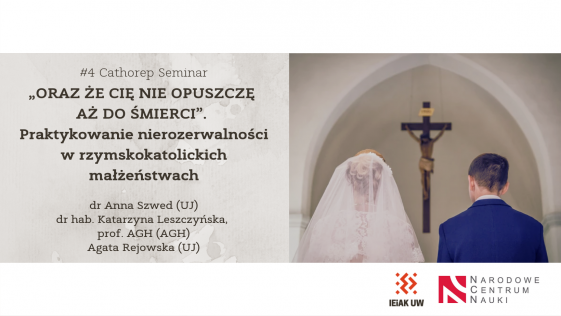
19.01.2022 o godz. 12 zapraszamy na kolejne seminarium online (nagranie)
„Oraz że cię nie opuszczę aż do śmierci". Praktykowanie nierozerwalności w rzymskokatolickich małżeństwach
dr Anna Szwed, dr hab. Katarzyna Leszczyńska, prof. AGH, Agata Rejowska
Opis:
Przemiany intymności charakterystyczne dla ponowoczesnych społeczeństw spowodowały, że wzory życia w parze uległy znacznemu zróżnicowaniu, a małżeństwo stało się tylko jedną z możliwych opcji wyboru. Choć trwałe związki pozostają dla wielu osób punktem odniesienia w projektowaniu swojego życia intymnego, to idea związku „na zawsze” i „na wyłączność” straciła swój dominujący status w świeckim świecie. Tymczasem jest ona konsekwentnie podtrzymywana przez Kościół rzymskokatolicki w postaci reguły nierozerwalności małżeństwa, rozumianego jako wyłączny związek kobiety i mężczyzny.
W naszym wystąpieniu chcemy pokazać, jak ta abstrakcyjna reguła, nakładana na wiernych przez instytucję Kościoła, jest przekładana na konkretne praktyki podejmowane przez religijne kobiety w codziennym życiu i jak te praktyki wytwarzają zwrotnie nieformalne reguły podtrzymywania małżeństwa. Proponujemy przyjrzenie się tym procesom przez pryzmat zarówno praktyk zrutynizowanych, cyklicznych w ramach małżeństwa, jak i będących reakcjami na kryzysy oraz „tąpnięcia” zachodzące w związku. Odwołujemy się do danych zebranych w ramach badań jakościowych, które prowadziłyśmy wśród wielkomiejskich, wykształconych i zaangażowanych religijnie rzymskich katoliczek, w ramach projektu „Opór i podporządkowanie. Sprawczość religijna rzymskokatolickich kobiet w Polsce”, finansowanego ze środków NCN. Bazując na zebranym materiale badawczym, wybrałyśmy trzy typy praktyk: religijnego ujednorodniania, sakralizowania codzienności oraz osadzania związku w katolickich sieciach, za pomocą których zaangażowane religijnie katoliczki realizują w codziennym życiu katolicką regułę nierozerwalności małżeństwa.
Bio:
Anna Szwed – doktor socjologii, adiunktka w Instytucie Socjologii Uniwersytetu Jagiellońskiego. Jej zainteresowania naukowe koncentrują się wokół zagadnień płci i religii, religijności kobiet, lived religion i obecności religii w sferze publicznej. Autorka artykułów poświęconych kobietom i katolicyzmowi oraz dyskursowi Kościoła rzymskokatolickiego. Autorka książki Ta druga. Obraz kobiety w nauczaniu Kościoła rzymskokatolickiego i w świadomości księży (Nomos, Kraków 2015). Obecnie (2018-2022) kierowniczka projektu poświęconego religijności kobiet „Opór i podporządkowanie. Sprawczość religijna rzymskokatolickich kobiet w Polsce”, finansowanego ze środków NCN.
Katarzyna Leszczyńska jest socjolożką, profesorką na Wydziale Humanistycznym Akademii Górniczo-Hutniczej w Krakowie. Interesuje się socjologią płci, organizacji i religii oraz socjolingwistyką. Kierowała projektami badawczymi wspieranymi przez NCN, poświęconymi m.in. relacjom między płcią, organizacjami religijnymi a kontekstem kulturowym, polskim i migracyjnym. Autorka książek, m.in. „Płeć w instytucje uwikłana” (2016), „Cztery wizje Europy. Analiza wypowiedzi Jana Pawła II i duchownych Kościoła w rzymskokatolickiego w Polsce” (2009), współredaktorka prac zbiorowych, np. „Kobiety i religie” (2006). Autorka i współautorka wielu artykułów naukowych w krajowych i międzynarodowych czasopismach („Journal of Contemporary Religion”, „Polish Sociological Review”, „Studia Socjologiczne”, „Journal of Alternative Spiritualities and New Age Studies”).
Agata Rejowska jest doktorantką w Instytucie Socjologii i asystentką w Instytucie Religioznawstwa Uniwersytetu Jagiellońskiego w Krakowie, a w 2021 roku odbyła również staż w Centrum Socjologii Kulturowej Uniwersytetu Yale jako visiting assistant in research. Jest kierowniczką projektu pt. „Śluby humanistyczne jako społeczne performanse. Rekonstrukcja znaczeń”, finansowanego przez Narodowe Centrum Nauki w ramach konkursu „Preludium”. Od 2019 roku jest również członkinią grupy badawczej realizującej pod kierownictwem dr Anny Szwed projekt pt. „Opór i podporządkowanie. Sprawczość religijna rzymskokatolickich kobiet w Polsce.”, finansowany przez NCN. Publikowała w czasopismach takich jak Sociology of Religion, Social Compass czy Polish Sociological Review.
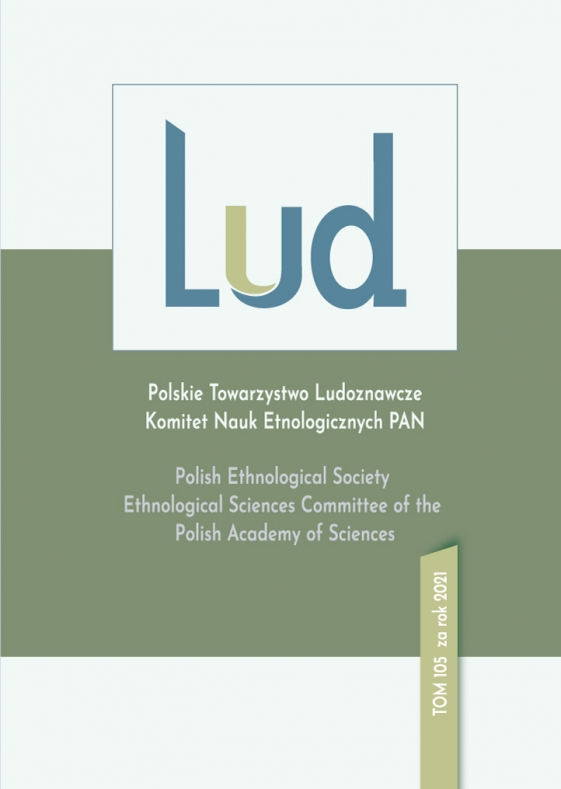
[22.12.2021] Nowy artykuł naszego zespołu w wolnym dostępie: Agnieszka Kościańska, Agnieszka Kosiorowska, Natalia Pomian, “A woman should follow her own conscience”: understanding Catholic involvement in demonstrations against the abortion ban in Poland, "Lud", 2021, t. 105
Abstract: In October 2020, a ruling by Poland’s Constitutional Tribunal effectively ending legal abortion incited mass protests across the country. Despite the demonstrations being directed at both the government and the Catholic Church, many devout Catholics joined the protests against the Church’s opposition to family planning being enacted through state-imposed prohibition. Drawing on ongoing archival and ethnographic research, in this paper we address a number of issues relating to Catholicism and abortion: how it is possible that so many Catholics decided to take part in pro-choice marches openly opposing official Catholic teaching on birth control? What were their motivations?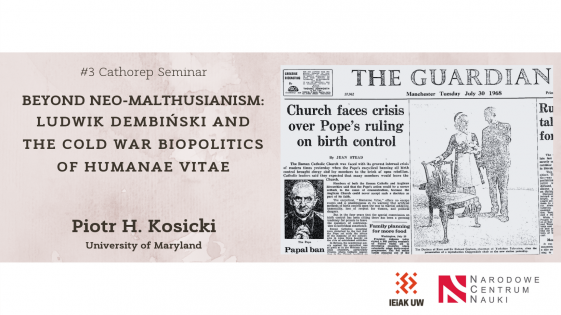
12.13.2021, godz. 15, trzecie zdalne seminarium Katorepu
Piotr H. Kosicki, Beyond Neo-Malthusianism: Ludwik Dembiński and the Cold War Biopolitics of Humanae Vitae
Abstract: In response to the global Catholic aggiornamento that followed the death of Pope Pius XII, extensive cultural and intellectual transfers blossomed between budding milieus of Catholic intellectuals in the Global North and Global South, as well as across the Iron Curtain. This paper takes as a case study the Polish Catholic intellectual Ludwik Dembiński, a law professor from Lublin and co-founder of the Polish Catholic Intelligentsia Club (KIK) movement who in 1967 joined the leadership of the Swiss-based Catholic NGO Pax Romana. In his capacity as secretary general for Pax Romana’s “adult” movement (i.e. for university graduates, as opposed to its youth movement), Dembiński in 1968 found himself moderating and overseeing heated debates about the encyclical Humanae Vitae that threatened to tear apart the fragile global Catholic intellectual community built over the past decade. Developmentalist discourse became inextricably embedded in debates over natality and reproduction, with Catholics from behind the Iron Curtain joining activists from across the Global South to embrace Humanae Vitae and to accuse its Western opponents of neo-Malthusianism and neo-imperialism.
Bio: Piotr H. Kosicki is Associate Professor of History at the University of Maryland. Recipient of a PhD from Princeton, he has published widely on the history of the Catholic Church, on the intellectual entanglements of Poland and France and on the Cold War, including Catholics on the Barricades: Poland, France, and “Revolution,” 1891-1956 (Yale, 2018) and, as editor, Christian Democracy and the Fall of Communism (2019, with M. Gehler and H. Wohnout), Christian Democracy across the Iron Curtain (2018, with S. Łukasiewicz), The Long 1989 (2019, with K. Kunakhovich), and Vatican II behind the Iron Curtain (2016). His essays have appeared in Commonweal, The TLS and the Washington Post.
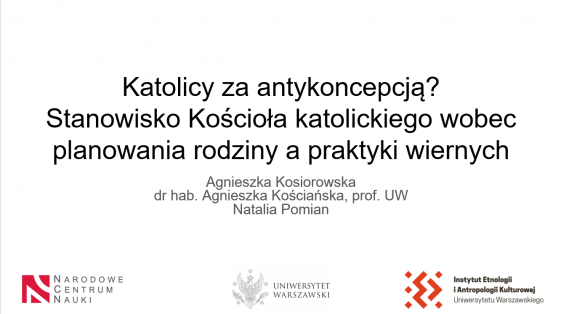
[01.10.2021] Agnieszka Kosiorowska, Agnieszka Kościańska i Natalia Pomian wzięły udział w VI Międzynarodowym Kongresie Religioznawczym w Krakowie „Wiara – wyobraźnia – wiedza. Nowe drogi religioznawstwa w XXI wieku”, gdzie zaprezentowały referat pt. „Katolicy za antykoncepcją? Stanowisko Kościoła katolickiego wobec planowania rodziny a praktyki wiernych”.
Abstrakt:
Dziś stanowisko Kościoła katolickiego wobec kontroli urodzeń wydaje się klarowne – akceptowane są wyłącznie tzw. naturalne metody planowania rodziny. Wszelkie inne formy antykoncepcji uważa się za grzeszne. W Polsce nawet rozmowy o nich, czyli edukację seksualną, często przedstawia się jako wymysły „genderystów” skierowane przeciwko rodzinie, mające na celu „seksualizację” dzieci. Takie myślenie jest jednak stosunkowo nowe. W referacie przyjrzymy się historii katolickich debat wokół kontroli urodzin oraz temu, jak przekładały się one na praktyki planowania rodziny w wśród wiernych. Odtwarzamy publicystykę postępowych działaczy katolickich z lat 60. XX wieku i zastanawiamy się, jak to się stało, że została ona niemal całkowicie wyparta przez dominujące dziś myślenie konserwatywne, wskazując na rolę, jaką odegrała encyklika Humanae Vitae i pontyfikat Jana Pawła II. Owe dyskursy zestawiamy ze wstępną analizą wywiadów pogłębionych, z reprezentującymi różne pokolenia i grupy społeczne katolikami, dotyczących praktyk związany z planowaniem rodziny i przekonań, w tym publicystyki katolickiej, leżących u ich podłoża. Wskażemy na rozdźwięk między ustanowionymi zasadami Kościoła katolickiego a praktykami jego wiernych.

[07-10.09.2021] Członkinie naszego zespołu wzięły udział w konferencji „Faith, Medicine and Religion” organizowanej przez Europejskie Towarzystwo Historii Medycyny i Zdrowia na Katolickim Uniwersytecie Lowańskim w Belgii. Uczestniczyły w panelu „Catholic Discourses on Reproductive Health in State-Socialist Poland, 1960s-1990s” i wygłosiły następujące referaty:
Agata Ignaciuk i Natalia Jarska
Debating premarital sex in Catholic and state-socialist Poland
This paper examines the discourses surrounding youth sexuality in state-socialist and Catholic Poland, particularly the ideas surrounding “virginity”. Secular advice literature and sexological writings published between the late 1950s and the end of Polish communism in 1989 presented ambiguous and non-homogeneous discourses on premarital sex. The “culture of sexuality” promoted by experts tended to be limited to marital relationships: explicit advice on sex was largely directed at married couples or in the framework of “preparation for marriage”. While secular experts did not brand premarital sex as immoral, throughout the 1960s, 1970s and 1980s, they provided a range of medical and social arguments against the practice, at times based on gender hierarchies. Analogically, throughout the state-socialist period, both popular books aimed at the Catholic public and available in libraries, and unpublished scripts for the clergy and lay Catholics delivering “preparation for marriage” training at various levels, welded sex with marriage and forbade premarital sexual activity. The anticipated negative consequences of premarital sex were, again, steadfastly gendered: girls and women would suffer most as they were not only deemed responsible for controlling male sexual urges and advances, but also sexual violence. We concluded that overlaps and mutual borrowings existed in Catholic and secular approaches to premarital sexuality. While secular experts were unlikely to conceptualize premarital sex as a sin, they often mirrored Catholic views by framing the discourse in love, sex, responsibility and social danger.
Natalia Pomian
Faith and lack of offspring: infertility in the Catholic press in Poland (1956-1989)
With the end of the Stalinist era, the traditionally defined family and the Catholic vision of marriage regained prominence in Poland. Catholic premarital education, institutionalised in Poland from the late 1960s onward, prepared future spouses to parenthood. But what happened with the couples who had difficulties to conceive? In 1980s, a reported 10% of marriages were struggling with fertility problems, and in mid-1980s 3,4% of couples married for 10 or more years remained childless. Even though the Catechism of the Catholic Church highlights that childless couples can be fruitful through love, openness to others and sacrifice, the social and political pressure to have children in Poland remained enormous. This paper analyses the debates about infertility and childlessness in Poland through the pages of "Tygodnik Powszechny" - a Catholic weekly magazine focusing on social and cultural issues. I am particularly interested in underscoring the proposed solutions to the problem of infertility/childlessness, such as adoption and medical treatment of infertility (including insemination and in vitro fertilization), and the hierarchies established between these solutions. As sociological research showed, only 16% of infertile women were considering adoption, the rest chose long-term treatment or, as a last resort, 8% would choose artificial insemination. Looking at early discussion on infertility in a popular Catholic medium enables the understanding of the controversies attached to the contemporary Catholic approach to this problem and the social context of creating methods of therapy that suits Catholic ethics (e.g. naprotechnology).
Agnieszka Kosiorowska
Fair, natural, and reasonable. Sexuality and reproduction in the discourse of a religious organisation of Polish migrants in France
“A child in a marriage is its most honourable goal, and the decisions regarding having offspring are up to the parents. The Church only wants these decisions to be fair, in accordance with the laws of Nature, and reasonable” (1980). These words come from a 1980 issue of a newspaper published under the patronage of the Polish Catholic Mission (PCM) in France. The PCMs exist in twenty-eight different countries of the world, and exercise pastoral care over Polish migrants living in those countries. They play an important role in the lives of migrant communities, helping migrants with practical problems of everyday life and serving to sustain community bonds and cultural identity. This paper focuses on ways in which the PCM in France attempted to shape gendered health practices of migrants, in particular those related to reproductive health. I focus on the 1980s and 1990s, a time when the PCM in France assisted a large inflow of Polish economic migrants who left Poland due to the economic crisis during the last decade of state socialism. I analyse the PCM’s newspaper “Głos Katolicki” (1980-1999) and focus on specific advice concerning reproductive health and sexuality, and behaviours and practices constructed as (un)healthy for men and for women. My hypothesis is that Polish Catholic Mission in France tried to manage and influence migrants’ sexual and reproductive practices, considering that Polish people’s practices in this matter should be different to those thought to be a norm in the French society.
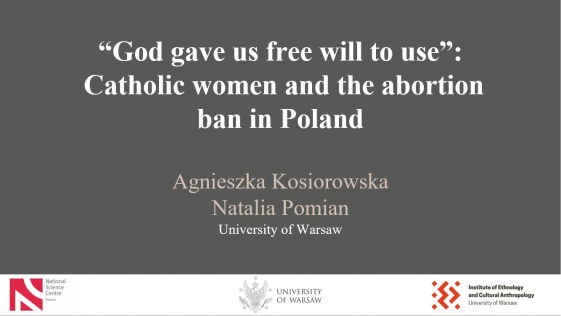
[31.08.2021] Agnieszka Kosiorowska i Natalia Pomian wzięły udział w 18. dorocznej konferencji Europejskiego stowarzyszenia na rzecz badań nad religią "Resilient Religion", która odbyła się w dniach 30.08-03.09 na Uniwersytecie w Pizie. Zaprezentowały referat pt. “God Gave us Free Will to Use”: Catholic Women and the Abortion Ban in Poland.
Abstract: The commonly named abortion compromise that had existed in Poland since 1993, allowed the procedure to be performed in only three situations: when pregnancy was the result of a criminal act, when a woman’s health was endangered by continuing the pregnancy, and when the foetus was seriously and irreversibly impaired. However, on October 22 of last year the Polish Constitutional Tribunal adjudged the lattermost exception to be unconstitutional. Despite the mass demonstrations against this verdict denouncing both the government and the Catholic Church, many devout Catholics joined the protests. Drawing on ongoing archival and ethnographic research, we address a number of issues relating to Catholicism and abortion. Why have so many Catholics decided to participate in marches openly opposing official Catholic teaching? What were their motivations? And – finally – what are the genealogies of the concepts underpinning these motivations? To answer these questions, we explore the opinions relating to abortion of three generations of Polish Catholics. We present strategies they have employed to negotiate with the Church’s stance on abortion, including emphasising both the importance of acting on one’s own conscience and the subjective situations of individual women’s lives, as well as insisting that abortion law is not a matter in which the Church should intervene. Finally, we discuss the notion of a “mature rebellion” against the Church, a concept that appears in the accounts of several Catholic protesters.
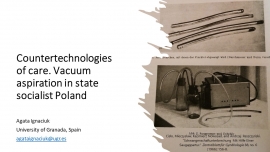

[12.07.2021] Agata Ignaciuk i Sylwia Kuźma-Markowska wzięły udział w warsztacie online zorganizowanym przez Herder Institute for Historical Research on East Central Europe. Wygłosiły referaty “Countertechnoogies of care. Vacuum aspiration in state-socialist Poland” (Ignaciuk) i “Conflicts and interdependencies. Family planning narratives and activism in interwar Poland” (Kuźma-Markowska). Członkinie zespołu Katorep nawiązały współpracę z networkiem badawczym zajmującym się historią planowania rodziny w Europie.

[25.06.2021] Agata Ignaciuk i Agnieszka Kościańska uczetniczyły w zdalnej 27th International Conference of Europeanists (21-25.06.2021). Zaprezentowały referaty w ramach sesji Polish Abortion Utopias and Dystopias.
Agata Ignaciuk, An Abortion Utopia? Abortion Discourses in State-Socialist Poland
In October 2020, the Polish Constitutional Court, the country’s highest judicial body, declared abortion due to foetal malformation unconstitutional. The decision is a culmination of decades of the escalating criminalization of abortion which began in the early 1990s, during the country’s transition to democracy. The 1993 abortion law reform dismantled the state-socialist regulation according to which abortion was available practically on demand. In light of the near-total abortion ban on the horizon, the state-socialist abortion scene seems like a paradise. Nevertheless, this paper problematizes such an assumption by examining public representations and intimate narratives of abortion in Poland from the late 1950s to late 1980s. I argue that in state-socialist Poland three abortion discourses intersected. In the expert discourse, abortion was represented as a dangerous surgery and women who terminated pregnancies as careless and irresponsible. In the Catholic discourse, which fiercely opposed legal abortion, termination was a sin and those who underwent it were criminals, victims or both. In the narratives of women who counted on wide access to abortion, a normality discourse emerged. Those who had abortion rationalized it terms of personal choices largely uncontaminated by medical or religious stigmatization. I conclude that when the democratic transition began in 1989, the intersection of these three discourses produced a framing of abortion incompatible with a reproductive rights discourse. It was not until the mass social mobilizations linked to the “Black Protests” (2016) when abortion rights in Poland became a shared utopia.
Agnieszka Kościańska, A Utopia for the Unborn: Polish Catholic Concepts of Gender Equality in the Family
“Liberating the man from the limitations of his nature might only happen through elevating and embracing female qualities”, wrote Wlodzimierz Fijalkowski, a Polish Catholic doctor, in 1984. He and other Catholic authors argued that men should be involved in family planning and child care. They also supported women’s work outside the house as an important space for female self-development and showed that gender equality was one of the keys to marital harmony. This attitude contrasted with the approach of many secular experts under late socialism: marriage advice specialists presented gender equality as an obstacle to a successful sex life; the socialist state advocated for women’s involvement in formal employment, but hardly ever promoted any re-definition of gender roles within the household.
I examine the development of Catholic concepts of gender equality under late socialism, post-socialism and currently to argue that they served multiple purposes. Some progressive Catholics envision the family based on equity, but for others these ideas have been closely related to Catholic involvement in the anti-abortion movement that resulted in an almost total ban on abortion in Poland in 2020. Within this framework, the Catholic idea of gender equality in the family is limited by the welfare of the unborn: women should self-develop to become better mothers but lose their rights once they become pregnant; men are needed in the household to ensure that women do not consider abortion. In effect, the Catholic utopia of gender equality in the family is in fact a utopia for the unborn.
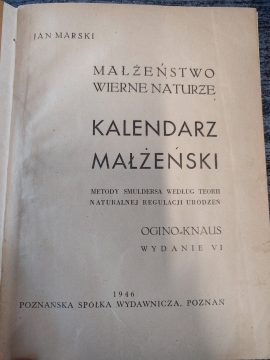
[4.06.2021] Na konferencji MOTHER, FATHER, CHILD, HEALTH – THE HISTORY OF REPRODUCTION. The 18th Conference of the German-Polish Society for the History of Medicine, współorganizowanej przez Centrum Badań Historycznych PAN w Berlinie, Sylwia Kuźma-Markowska i Natalia Jarska wygłosiły referat pt. Love and Calendar: The Catholic Church and Family Planning in Poland (1930-1956/57). W referacie, opartym na analizie kilkudziesięciu publikacji katolickich na temat małżeństwa i planowania rodziny, przedstawiły wnioski dotyczące czterech wątków katolickiego nauczania: propagowanej wielkości rodziny, miejsca seksualności w nauczaniu o małżeństwie, regulacji urodzeń oraz poglądów na temat płci. Treści i formy propagowania katolickiej nauki o planowaniu rodziny zachowały ciągłość w całym omawianym okresie.
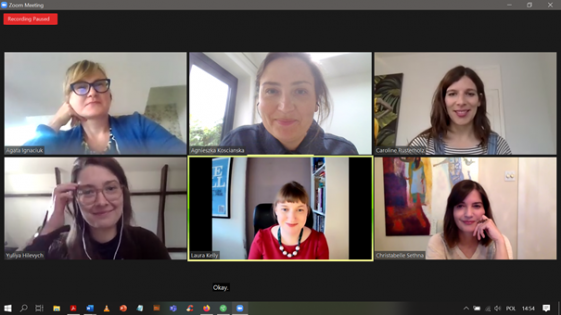
[13.05.2021] Agata Ignaciuk i Agnieszka Kościańska uczestniczyły w 94. Zjeździe American Association for the History of Medicine (12-16.05 2021)
Panel: Reproductive Health Archives in Pandemic Time
Moderatorka: Agata Ignaciuk, University of Granada
Panelistki: Yuliya Hilevych, University of Lincoln, University of Cambridge; Caroline Rusterholz, University of Cambridge; Laura Kelly, University of Strathclyde; Christabelle Sethna, University of Ottawa; Agnieszka Kościańska, University of Warsaw
O panelu: Reproductive health, simultaneously intimate and public, personal and political, has emerged as one of the central themes in social history of medicine. In times of the COVID-19 pandemic, it becomes particularly salient that rights linked to reproduction are unconsolidated rights, prone to implicit and explicit vulnerability in contexts of crises. In Europe, examples of such challenges to reproductive rights have ranged from banning partners from accompanying women during hospital childbirth (as has happened in Poland and parts of Spain during the confinement months in spring 2020) to the impact of closing borders on the ability of women living in countries with restrictive abortion jurisdictions or limited abortion access to seek terminations abroad. The COVID-19 pandemic has not only affected the experiences of reproductive health, but also the possibilities of scholarly enquiry into its history. The prospect of accessing or creating the reproductive health archive, in which institutional sources are often secondary to the personal ones, and where personal narratives play a prominent role in illuminating the intimate and the public histories of reproductive health, has been transformed. This session brings together historians, anthropologists and sociologists working on different aspects of the history of reproductive health in the 20th century, including social and cultural histories of adoption, infertility, family planning, queer and teen sexuality, and abortion travel in a number of local contexts (UK, Ireland, the Netherlands, Poland, Ireland, Canada) and transnationally. The aim of the session is two-fold. First, we will debate around the broad concept of the reproductive health archive: what constitutes it? How is it created, preserved, exposed, analysed? Second, we will reflect on ways the pandemic has affected the scholarly practices around the reproductive health archive: how does the present health crises affect the historical pursuing, analysis and interpretation of past reproductive health narratives and what lessons can we learn from the current situation?
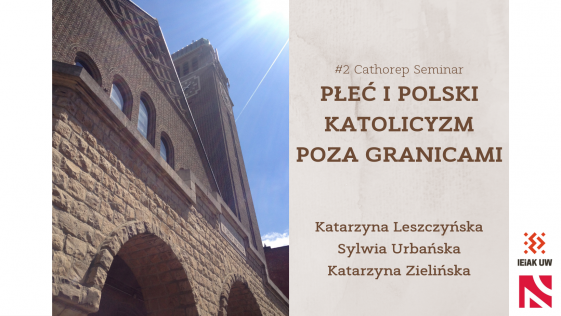
Zapraszamy na kolejne seminariu (szczegóły techniczne na naszym profilu na fb): 6.05.2021, godz. 12. Nagranie
#2CathorepSeminar: Płeć i polski katolicyzm poza granicami
Co się dzieje w polskich organizacjach Kościoła rzymskokatolickiego poza granicami kraju? Organizacje te muszą działać w społeczeństwach pluralistycznych i wielokulturowych, o znacznym stopniu sekularyzacji, w których o wiele bardziej powszechne niż w Polsce są idee równości płci i emancypacji. Czy otwierają się na nowe egalitarne wzory, czy też konserwatywnie okopują i zamykają? Nasze wystąpienie będzie próbą zrozumienia, w jaki sposób, kto i dlaczego zmienia wzory płciowe w organizacjach Polskich Misji Katolickich w Anglii, Belgii i Szwecji.
Katarzyna Leszczyńska jest socjolożką, profesorką na Wydziale Humanistycznym Akademii Górniczo-Hutniczej w Krakowie. Interesuje się socjologią płci, organizacji i religii oraz socjolingwistyką. Kierowała projektami badawczymi wspieranymi przez NCN, poświęconymi m.in. relacjom między płcią, organizacjami religijnymi a kontekstem kulturowym, polskim i migracyjnym. Autorka książek, m.in. Płeć w instytucje uwikłana (2016), Cztery wizje Europy. Analiza wypowiedzi Jana Pawła II i duchownych Kościoła w rzymskokatolickiego w Polsce (2009), współredaktorka prac zbiorowych, np. Kobiety i religie (2006). Autorka i współautorka wielu artykułów naukowych w krajowych i międzynarodowych czasopismach („Journal of Contemporary Religion”, „Polish Sociological Review”, „Studia Socjologiczne”, „Journal of Alternative Spiritualities and New Age Studies”).
Sylwia Urbańska jest adiunktką w Instytucie Socjologii Uniwersytetu Warszawskiego. Bada przemiany rodzin, macierzyństwa i wzorców płci w procesach migracji oraz w społecznościach wiejskich. Autorka książki Matka Polka na odległość. Z doświadczeń migracyjnych robotnic 1989–2010 (2015) oraz współautorka pracy Mozaiki przestrzeni transnarodowych. Teorie, metody, zjawiska (2012). Jej teksty naukowe ukazały się m.in. w czaso-pismach „Central and East European Migration Review”, „Qualitative Sociology Review”, „Lud”, „Stan Rzeczy” oraz w antologiach: Pożegnanie z Matką Polką. Dyskursy, praktyki i reprezentacje macierzyństwa we współczesnej Polsce (2012) i Niebezpieczne związki. Macierzyństwo, ojcostwo i polityka (2015). Laureatka Nagrody Prezesa Rady Ministrów. Działa w Polskim Towarzystwie Socjologicznym, Komisji ds. Migrantów RPO i Polskim Towarzystwie Genderowym.
Katarzyna Zielińska jest profesorką w Instytucie Socjologii Uniwersytetu Jagiellońskiego. Bada związki pomiędzy religią a polityką, religią a płcią społeczno-kulturową oraz religią a tożsamościami zbiorowymi, szczególnie w Europie Środkowowschodniej. Jest autorką wielu artykułów publikowanych w krajowych i międzynarodowych czasopismach (m.in. „Studia Socjologiczne”, „Lud”, „East European Politics and Societes” i „Religion, State and Society”) i dwóch książek: Spory wokół sekularyzacji (2009) oraz W walce o hegemonię? Religia w polskiej sferze publicznej na przykładzie debat sejmowych (2018). Jest również współredaktorką kilku publikacji, np. Opór i dominacja. Antologia tekstów (2019) z Agnieszką Pasieką, oraz Collective Identity and Democracyin theEnlarging Europe (2012) ze Zdzisławem Machem i Magdaleną Górą. Aktywnie działa w International Study of Religion in Eastern and Central Europe Associacion oraz w Polskim Towarzystwie Socjologicznym.
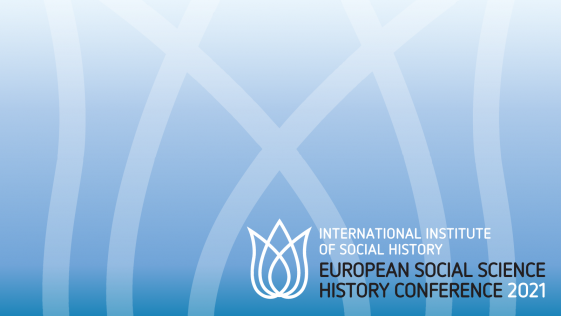
[27.03.2021] Nasz zespół na zdalnej konferecji ESSHC. Agnieszka Kościańska poprowadziła sesję Activism around Sexual and Reproductive Health Counselling across Europe: Forms of Resistance and (De-)medicalisation from Below w ramach, której Agata Ignaciuk zaprezentowała referat “Do not use - Love”. Sexual and Contraceptive Expertise and Anti-abortion Activism in Catholic Preparation for Marriage in Poland during Late Socialism.

[21.03.2021] Agnieszka Kościańska opowiada o zmianach w katolickim podejściu do aborcji w podkaście The Fourcast: The women trapped and traumatised by Poland’s near-total abortion ban. Posłuchaj.
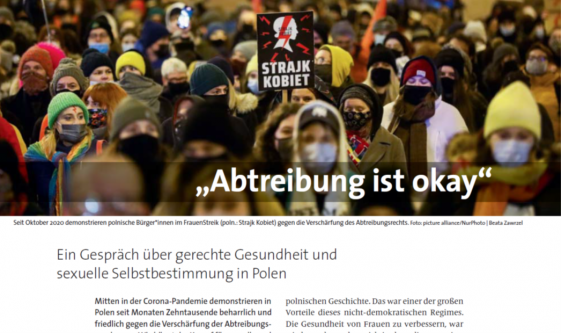
[24.02.2021] Agata Ignaciuk i Agnieszka Kościańska opowiadają o naszych badaniach w jubileuszowym (250) numerze "Dr. med. Mabuse"
"Im sozialistischen Polen wurde eine Basis-Gesundheitsversorgung für die breite Bevölkerung zugänglich - eine grundlegende Neuerung in der polnischen Geschichte. Das war einer der großen Vorteile dieses nicht-demokratischen Regimes. Die Gesundheit von Frauen zu verbessern, war wiederum besonders wichtig, denn dies garantierte die Reproduktion der gesunden Bevölkerung. Der Schutz der Gesundheit von Frauen war auch ein zentrales Argument bei der Legalisierung der Abtreibung 1956. Denn Frauen, die illegale, unsichere Abtreibungen in Anspruch nehmen mussten, erkrankten oder starben viel häufiger."
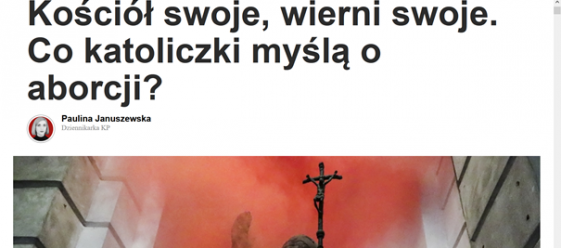
[20.02.2021] Agata Ignaciuk i Agnieszka Kościańska opowiadają o naszych badaniach na łamach Krytyki Politycznej
"Dyskusję na ten temat należałoby jednak zacząć od odrzucenia paru błędnych, ale dobrze zadomowionych w publicznym dyskursie uproszczeń. Poglądy religijne nie wyznaczają sztywnego i prostego podziału na zwolenników i przeciwników aborcji. Nie istnieje też coś takiego jak monolityczny katolicyzm, choć w kręgach feministycznych czy lewicowo-liberalnych przywykliśmy do mówienia o Kościele jako jednolitej całości".
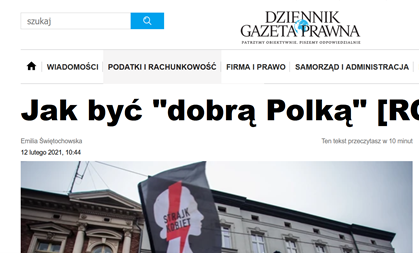
[12.02.2021] Agata Chełstowska i Natalia Pomian opowiadają o naszych badaniach w "Dzienniku. Gazecie Prawnej"
NP: Kobiety – katoliczki, z którymi rozmawiałam ostatnio, urodziły się w latach 50. lub nieco później, część z nich jest związana z ruchami tzw. Kościoła otwartego. Młodość przeżyły więc w okresie, kiedy aborcja była dostępna na żądanie. Nie był to wówczas temat dyskusji. Czasem w rozmowach z koleżankami rzucano coś o przerwaniu ciąży między wierszami, tak jak wspomina się o nowej fryzurze. Aborcję traktowano raczej jak zwykły zabieg. Przerywanie ciąży nie było również przedmiotem rozważań w samym Kościele. Moje rozmówczynie nie pamiętają, by w latach 60. czy 70. słyszały kazania na ten temat.
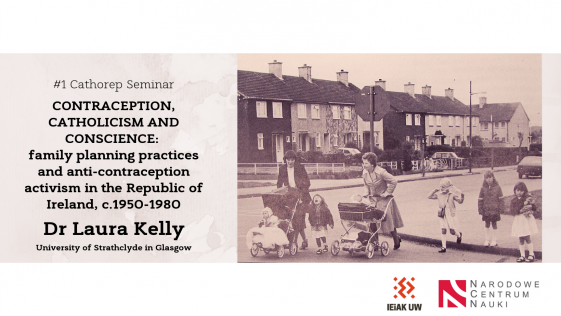
[1.02.2021] Seminarium "katorepu"
Dr Laura Kelly, Contraception, Catholicism and Conscience: family planning practices and anti-contraception activism in the Republic of Ireland, c.1950-1980
Contraception was illegal in the Republic of Ireland from 1935 to 1979 and artificial contraceptives were difficult to access before legalisation. The contraceptive pill was available as a ‘cycle regulator’ from 1963, but access depended on a sympathetic doctor.
With the establishment of family planning clinics in urban centres such as Dublin, Galway, Limerick and Cork from the 1970s, it became possible for some middle-class, urban-based men and women to access contraception. However, the majority of men and women struggled to access contraceptives. While recent valuable studies have illuminated the role of the
Catholic Church hierarchy, Irish government and the medical profession in debates surrounding contraception in Ireland in the twentieth century, the experiences of ‘ordinary’ men and women have been severely neglected. This paper seeks to address this significant gap. The first part of the paper will draw primarily on new oral history interviews with over 100 Irish men and women born before 1955, exploring the birth control practices in Ireland prior to the legalisation of contraception in
1979. In particular, the paper will highlight the impact of Church teachings on individuals’ knowledge and understanding of sex and reproduction as well as decision-making processes in relation to family planning. Ultimately, the paper will emphasise individuals’ agency and resilience in the face of legal and religious restrictions and suggest that couples planning their
families in the wake of Humanae Vitae were beginning to follow their own consciences in relation to birth control. The second part of the paper will briefly explore the role of anti-contraception campaigners and activists in debates around the legalisation of contraception in Ireland, illustrating these groups’ concern that the legalisation of contraception would lead to
the introduction of abortion.
Bio: Dr Laura Kelly is senior lecturer at the University of Strathclyde in Glasgow. She has published two monographs on the history of women in medicine and on medical education and student culture in Ireland respectively. Her current research project ‘Contraception and Modern Ireland, c.1922-92’ is funded by a Wellcome Trust research fellowship and forms the
basis of a forthcoming monograph with Cambridge University Press.
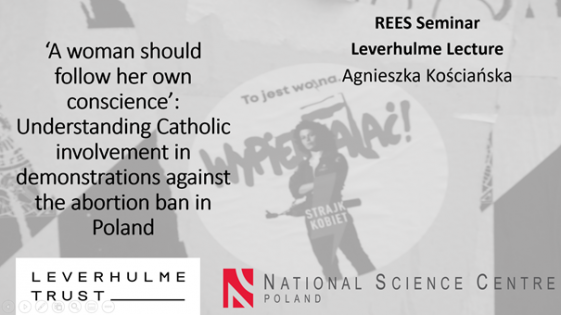
[21.01.2021] Agnieszka Kościańska zaprezentowała nasze badania w Oxford School of Global and Area Studies.
‘A woman should follow her own conscience’: Understanding Catholic involvement in demonstrations against the abortion ban in Poland
In October 2020, a ruling by Poland’s Constitutional Tribunal effectively ending legal abortion incited massive protests across the country. Despite the demonstrations being directed at both the government and the Catholic Church, many devout Catholics joined the protests against Church opposition to family planning being enacted through state-imposed prohibition.
Drawing on ongoing archival and ethnographic research, in this presentation I address a number of issues relating to Catholicism and abortion: how it is possible that so many Catholics decided to take part in pro-choice marches openly opposing official Catholic teaching on birth control? What were their motivations? And – finally – what are the genealogies of the concepts underpinning these motivations?
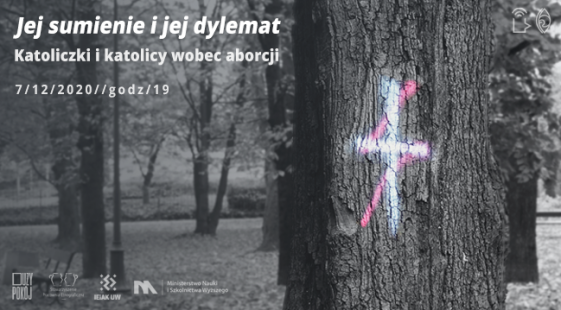
[7.12.2020] Agnieszka Kosiorowska, Agnieszka Kościańska i Natalia Pomian opowiadały o naszych badaniach w Pracowni Etnograficznej. Spotaknie pt. „Jej sumienie i jej dylemat” – katoliczki i katolicy wobec aborcji prowadziała Zuzanna Radzik. Do obejrzenia tutaj.
Opis wydarzenia: Niedawny wyrok Trybunału Konstytucyjnego sprawił, że do debaty publicznej powrócił temat przerywania ciąży, a ulice polskich miast i miasteczek wypełniły się osobami niezgadzającymi się z takim ograniczeniem praw reprodukcyjnych. Język dyskusji wokół aborcji jest upolityczniony i przepełniony emocjami, które od lat dzielą społeczeństwo. Jednak podział ten nie ogranicza się jedynie do binarnego rozróżnienia „pro” i „anty” choice, lecz pełen jest różnorodnych motywacji i postaw życiowych. W tegorocznych protestach ramię w ramię kroczą lewicowe aktywistki, osoby wcześniej nieangażujące się w życie polityczne, ale również wyborczynie Prawa i Sprawiedliwości i praktykujące katoliczki. To pokazuje, że mimo jasnego stanowiska Kościoła katolickiego w sprawie aborcji, postawy i praktyki katoliczek i katolików nie są już tak jednoznaczne. Jak więc wierni odnajdują się w świecie tych rygorystycznych zasad? Przywołując wstępne wyniki badań, które prowadzimy w ramach projektu „Katolicyzacja reprodukcji, reprodukcja katolicyzmu. Aktywizm i intymność w Polsce od 1930 r. do dziś” (NCN Opus), pokażemy, że praktyki reprodukcyjne są sferą negocjacji pomiędzy moralnością katolicką a praktykami dnia codziennego, które często opierają się na innych wartościach, czasami sprzecznych z doktryną.
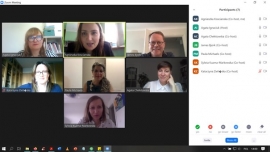

[15.11.2020] Nasz zespół zaprezentował wstępne wyniki badań w czasie zdalnego zjazdu Slavic, East European, and Eurasian Studies w ramach panelu Re-thinking Polish Catholic Approaches to Gender, Sexuality and Reproduction: Local and Transnational Perspectives, Past and Present
In the present virulent debates about the alleged threats of “gender/LGTBQ ideologies” and sex education in Poland, the Catholic Church has taken a key role. The longstanding ultra-conservatism of the Polish Catholic hierarchy in the realms of gender and reproduction, both on a local level and transnationally through the papacy of John Paul II, has obscured the diversity of voices and practices linked to Catholicizing sexuality, gender and reproduction within the broader Catholic community in Poland. This panel nuances and historicizes these current debates by examining Polish Catholic engagements with reproduction and gender practices from the second half of the twentieth century to the present. Rather than focusing on the norms produced and interpreted by the hierarchy, contributors to this panel bring historical, anthropological and sociological perspectives to place Catholic activist and intimate practices and negotiations of sexuality, femininity and masculinity at centre stage. Have Catholic intellectuals shaped alternative interpretations of sexual ethics? Have lay Catholics rebelled against the norms regarding ‘artificial’ contraception and abortion? In what ways has the transnationalisation of militant anti-abortion strategies fuelled new forms of local anti-abortion activism, carried out in defiance of the socialist State? How do transnational contexts, such as migration, influence perceptions and practices of gender in religious institutions? Through addressing these questions, this panel contributes to deconstructing the image of Polish Catholic sexual ethics and perceptions of gender as conservative and impervious to change while also placing current conflicts about gender and reproduction in the transnational context.
Nasze referaty:
Agnieszka Kościańska, “In Search of a New Marriage: Progressive Catholic
Activism of the 1960s”
Agata Ignaciuk i Agata Chełstowska, "Catholic Intimacies: Catholics Negotiating Birth Control in State-socialist Poland (1950s-1980s)”
Sylwia Kuźma-Markowska, “Transnational Dimensions of Catholic Anti-abortion Activism in the 1980s and early 1990s Poland”
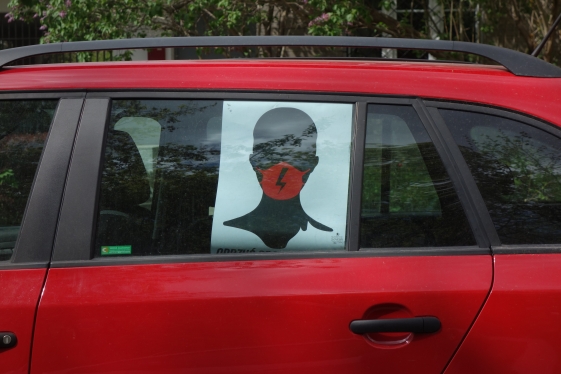
[25.10.2020] Artykuł, którego współautorką jest Agata Ignaciuk, ukazał się na blogu Agenda Pública jednego z największych hiszpańskich dzienników – "El País". Tekst omawia wyrok Trybunału Konstytucyjnego z 22 października 2020 roku w kontekście dłuższej historii regulacji prawnych i dostępu do aborcji w Polsce.
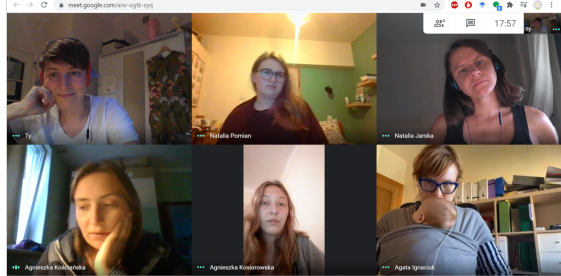
[6.10.2020] W czasie pandemii nasz zespół regularnie spotyka się zdalnie, żeby dyskutować o zebranych materiałach i pisanych artykułach. Pierwsze w roku akademickim 2020/2021 spotkanie było poświęcone katolickiej metodzie leczenia niepłodności - naprotechnologii.
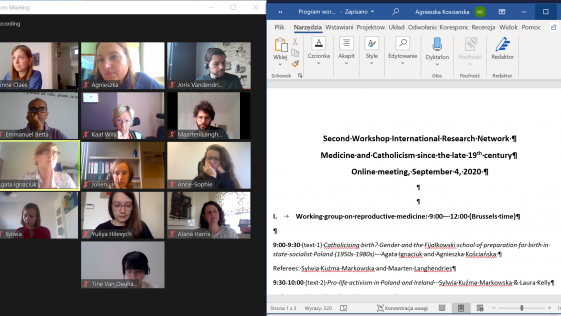
[4.09.2020] Agata Ignaciuk, Agnieszka Kościańska i Sylwia Kuźma-Markowska uczestniczyły w warsztacie sieci badawczej Medicine and Catholicism since the late 19th century. Agata Ignaciuk i Agnieszka Kościańska zaprezentowały artykuł pt. Re-gendering childbirth: Catholicism and medical activism around preparation for birth in state-socialist and early democratic Poland (1950s-1990s), a Sylwia Kuźma-Markowska, wraz z Laurą Kelly (University of Strathclyde), tekst pt. Pro-life activism in Poland and Ireland.
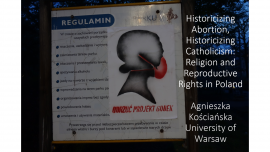
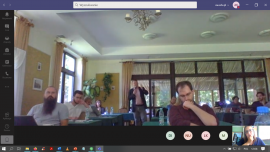
[3.09.2020] Agnieszka Kościańska zaprezentowała nasz projekt na konferencji Visegrád Anthropologists’ Network (V4 Net): Locating religion and nonreligion in Eastern/Central Europe, Konstancin-Jeziorna 02-05.09.2020.
Abstrakt: Historicizing Abortion, Historicizing Catholicism: Religion and Reproductive Rights in Poland
Gender and sexuality related issues, and abortion in particular, constitute the most heated debates and social conflicts in today’s Poland, mobilizing both religious and no-religious actors. The Church and conservative Catholic lay activists present reproductive rights as a threat to the nation and an attack on the unborn. Feminists, along with other liberal actors, consider reproductive rights as basic human rights and portray the Church as a major anti-democratic, anti-emancipatory and anti-women force. In this paper I draw on archival and ethnographic research into Catholic and secular understandings of sexuality, gender and reproduction, to analyze historical changes in abortion debates and practices in Poland. By historicizing both abortion and Catholicism, and exploring the discrepancy between Catholic Church teachings on birth control and actual family planning practices in Poland, I seek to understand what social, cultural, and political processes mobilize religious and non-religious actors to clash over abortion, or, using the theoretical framework of “virtual religion”, what conditions activate abortion conflicts, and are these related to actors’ life trajectories and birth control experiences, or to broader processes of defining the nation and its ideologies?

[23.07.2020] Agnieszka Kościańska zaprezentowała nasz projekt na zdalnym zjeździe Europejskiego Stowarzyszenia Antropologów Społecznych w panelu Critical social sciences in Eastern and Central Europe: No future?
Beyond Divisions: Re-thinking Sexuality, Reproduction and Catholicism in Poland
Poland is generally depicted as a predominantly Catholic country in which the Church governs people's souls and behaviors. Furthermore, Polish Catholicism is seen as inherently conservative and impervious to change. As this image influences both public debate and academic research, any discussion about the Catholic Church in regard to sexuality and reproduction in Poland is limited to vehement statements by the "progressive elites" ("the Church is solely responsible for the lack of sexual and reproduction rights") and "populist Catholics" ("feminists and LGBT activists pose a threat to the Polish nation"). In this roundtable intervention, I endeavor to deconstruct this image and search for other ways of approaching religion in Poland. Drawing on my research experience in the field of gender, sexuality and religion, including a new project entitled "Catholicising Reproduction, Reproducing Catholicism: Activist Practices and Intimate Negotiations in Poland, 1930-Present", I ask: How can research that goes beyond political divisions between "progressive elites" and "populist Catholics" and approaches the issues of Catholicism and sexuality in a more nuanced fashion be designed and conducted? Could anthropology - no longer an officially accredited academic discipline in Poland - contribute to crafting new ways of talking about sexuality and reproduction in the country? And, how can anthropologists engage politically to re-shape oversimplistic imaginaries and extend public debate beyond the entrenched political divisions?
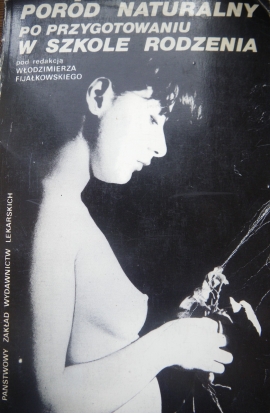
Znalezione w archiwum (13.07.2020):
W 1967 roku Państwowy Zakład Wydawnictw Lekarskich opublikował książkę pod tytułem „Szkoła rodzenia oparta na podstawach psychagogicznych” autorstwa Włodzimierza Fijałkowskiego. W publikacji, która doczekała się kilku wznowień, ginekolog nakreślił swój program przygotowania do porodu, którego centralnym zagadnieniem była (re)edukacja ciężarnych, które miały nauczyć się postrzegać poród jako „szczytowe doznanie macierzyństwa” i podczas porodu zachowywać się tak, aby ułatwić dziecku przyjście na świat. „Ochrona dziecka podczas porodu zabezpiecza pomyślny jego rozwój. Nie wystarczy dziecko urodzić, trzeba je dobrze urodzić”, pisał ginekolog związany w latach 60 XX wieku z II Kliniką położnictwa i Chorób Kobiecych Akademii Medycznej w Łodzi. W ciągu kolejnych dekad Fijałkowski rozwijał swój model szkoły rodzenia i obszernie publikował na ten temat w prasie fachowej i popularnej (jak książka „Poród naturalny po przygotowaniu w szkole rodzenia (PZWL, 1981) - na zdjęciu), dodając nowe elementy programowe reedukacji poprzez zajęcia przygotowujące do porodu: aktywą rolę ojców podczas ciąży, porodu i po urodzeniu dziecka, oraz przekazywanie słuchaczkom i słuchaczom szkoły idei ochrony „życia” od „poczęcia”.
 Życie naukowe w czasach pandemii (25.06.2020): Agnieszka Kościańska weźmie udział w zdalnym zjeździe EASA. Przygotowuje teraz prezentację pt. "Beyond Divisions: Re-thinking Sexuality, Reproduction and Catholicism in Poland", w której będzie mówić o naszym projekcie. Więcej informacji na stronie konferecji.
Życie naukowe w czasach pandemii (25.06.2020): Agnieszka Kościańska weźmie udział w zdalnym zjeździe EASA. Przygotowuje teraz prezentację pt. "Beyond Divisions: Re-thinking Sexuality, Reproduction and Catholicism in Poland", w której będzie mówić o naszym projekcie. Więcej informacji na stronie konferecji.
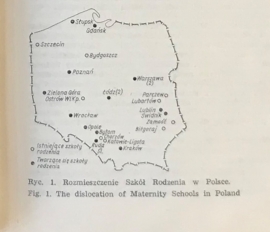
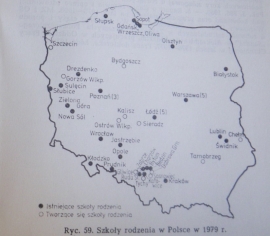
Znalezione w archiwum (21.05.2020): W drugiej połowie lat siedemdziesiątych miał miejsce dynamiczny rozwój szkół rodzenia w Polsce. Ilustrują to mapy – ta obrazująca stan z 1975 towarzyszyła opublikowanemu w 1976 w czasopiśmie Ginekologia Polska artykułowi Włodzimierza Fijałkowskiego, najważniejszego orędownika przygotowania do porodu w PRL. Mapka pokazująca szkoły rodzenia w Polsce 1979 pochodzi z książki pt. „Poród naturalny po przygotowaniu w szkole rodzenia” (Warszawa, PZWL; 1981), pod redakcją Fijałkowskiego.
(1.05.2020): W najnowszym numerze czasopisma "Medical History" znajdziemy wybór tekstów poświęconych transnarodowej historii katolicyzmu i antykoncepcji (XX wiek). Redaktorkami numeru specjalnego były Laura Kelly i Agata Ignaciuk. Zapraszamy do lektury wstępu (w wolnym dostępie) tutaj.
Znalezione w archiwum (20.04.2020): W odpowiedzi na zakazującą antykoncepcji encyklikę Humanae Vitae „Prawo i Życie” przedrukowało żart rysunkowy z „Frankfurter Allgemeine Zeitung”. Galileusz pociesza pigułkę antykoncepcyjną. „Nie martw się, przed 350 laty w mojej sprawie Watykan także się pomylił”.
21.03.2020: Biblioteki nieczynne, ale pracujemy. Udało się nam dostać zestaw potrzebnych książek w internetowym antykwariacie. Analizujemy prace Włodzimierza Fijałkowskiego - katolickiego lekarza, pioniera porodów rodzinnych w Polsce.
Znalezione w archiwum (21.02.2020): w latach 60. XX wieku katolicy w PRL żywo dyskutowali o planowaniu rodziny. W 1962 roku ukazał się numer "Więzi" poświęcony etyce seksualnej, podejmujący również kwestie katolickiego stosunku do antykoncepcji. O sprawie dyskutowali wspólnie wierzący i niewierzący. Wśród autorów m.in. Mikołaj Kozakiewicz (działacz i wieloletni szef Towarzystwa Planowania Rodziny), Wanda Półtawska (konserwatywna lekarka z Krakowa, która w następnych dekadach znacząco wpłynęła na stanowisko Karola Wojtyły), Anna Morawska (zwolenniczka personalizmu i liberalizacji katolickiej etyki seksualnej) oraz redaktor „Więzi” Andrzej Wielowieyski (autor jednego z najważniejszych katolickich poradników Przed nami małżeństwo).
Dr hab. Rafał Śmiałecki wzięła udział w sympozjum Sex, science, and censorship in the 19th and 20th centuries (17-18 lutego), współorganizowanym przez dr Agatę Ignaciuk na Uniwersytecie w Grenadzie. Wygłosiła referat pod tytułem “It will cause an official protest from the Episcopate”: Sexological Self-Censoring between the Communist State and the Catholic Church.
Poszukujemy studentek/studentów lub doktorantek/doktorantów do pracy w projekcie
Więcej
